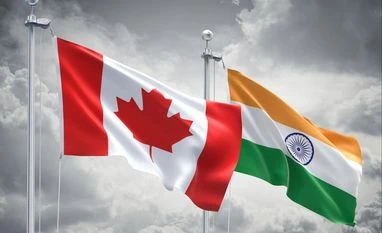The ongoing diplomatic row between India and Canada is not going to adversely impact the bilateral defence ties, Canada's Deputy Army Chief Major General Peter Scott said on Tuesday as the two-way relations plunged to an all-time low following Ottawa's allegations against New Delhi over the killing of a Khalistani separatist.
Scott, currently on a visit to India primarily to attend the Indo-Pacific Armies Chiefs' Conference (IPACC), told PTI that the matter should be resolved at the political level and it should not have a bearing on India-Canada military cooperation.
"That (the row) is not going to have an impact on us. We leave the matter at hand to the political level to try and resolve it. We are happy to be here and we do not see the issue clouding matters (military ties) at this point at all," he said.
The Canadian Army commander also complimented India for its role towards the common vision of a free, open, inclusive and rules-based Indo-Pacific.
The ties between India and Canada came under severe strain following Canadian Prime Minister Justin Trudeau's allegations of a "potential" involvement of Indian agents in the killing of Khalistani separatist Hardeep Singh Nijjar in British Columbia in June.
Last week, India rejected the allegations as "absurd" and "motivated" and expelled a senior Canadian diplomat in a tit-for-tat move to Ottawa's expulsion of an Indian official over the case.
More From This Section
India also announced temporarily suspending issuance of visas to Canadian citizens and asked Ottawa to downsize its diplomatic presence in the country.
Scott's trip to New Delhi is the first high-level visit from Canada to India after the diplomatic row broke out more than a week back following Trudeau's explosive remarks at the House of Commons.
"This is an issue between both our countries at a political level. And certainly our prime minister ... he rose at the House of Commons and made a statement requesting India's cooperation in the independent investigation that is currently ongoing at this time," the Canadian Vice Army Chief said.
"Between both of our armies, this is not affecting us. I spoke to your commander of the Army (Army Chief General Manoj Pande) last night. We both agreed that this is a political issue and has no interference on our (military) relationship," he added.
The two-day Indo-Pacific Armies Chiefs' Conference began on Tuesday. It is being attended by delegates from more than 30 countries.
"As two armies, we look for opportunities among the other 30 nations that are currently participating in this conference to find areas where we can cooperate, train together, conduct exercises and operations, so that we all can contribute to ensuring peace, stability within the region," Scott said.
Asked specifically whether the row will have no impact on India-Canada military ties, the Canadian Vice Army Chief said both armies will continue their ongoing engagement.
"Certainly between both of the armies, the way we see right now is that we will continue to cooperate, discuss, enjoy great forums like this where we can exchange ideas and find like-minded solutions to the difficulties facing a lot of the Indo-Pacific nations," he said.
To a question on India's role in the Indo-Pacific, Scott said it is the same as that of Canada's in the region while referring to New Delhi hosting the conference.
"That is why India can contribute and that is how they are doing it by hosting this conference, bringing all the nations together, so that we can discuss to ensure the maintenance of a rules-based order," he said.
"This forum provides the opportunity for the (military) leadership to come together in talking about difficult issues but also to find areas of cooperation," he added.
The Canadian Army official also referred to Ottawa's recently published Indo-Pacific strategy, which he said looks at ways that can contribute through a whole variety of different mechanisms.
"From my perspective, we will look for opportunities with other like-minded nations which are here to continue to strive to make sure that this region remains open, safe and secure and prosperous so that all nations in the Indo-Pacific region can maintain their sovereignty and enjoy a peaceful way of life," he said.
)